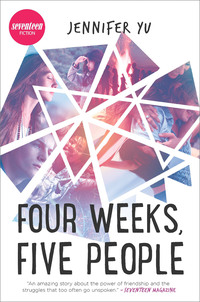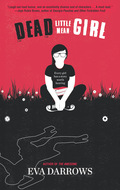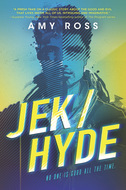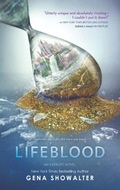Buch lesen: "Four Weeks, Five People"
They’re more than their problems
Obsessive-compulsive teen Clarissa wants to get better, if only so her mother will stop asking her if she’s okay.
Andrew wants to overcome his eating disorder so he can get back to his band and their dreams of becoming famous.
Film aficionado Ben would rather live in the movies than in reality.
Gorgeous and overly confident Mason thinks everyone is an idiot.
And Stella just doesn’t want to be back for her second summer of wilderness therapy.
As the five teens get to know one another and work to overcome the various disorders that have affected their lives, they find themselves forming bonds they never thought they would, discovering new truths about themselves and actually looking forward to the future.
Four Weeks,
Five People
Jennifer Yu

Making sure that my mother thinks that I’m having a good time at camp is probably more important than actually having a good time at camp.
I’m used to not having a good time at things that involve interacting with other people. I’ve long resigned myself to a lifetime of avoiding unnecessary social situations at all costs and, if forced to go, standing in the corner awkwardly while more exciting people talk around me. My mother, on the other hand, has hopes for me. She wants me to put myself out there and have some normal teenage experiences with “kids my age.” I mean, that’s why everyone goes to camp, right? I’m not sure how to explain to her that “normal experiences with kids my age” at wilderness therapy camp means living with a roommate who has brought an arsenal of banned items, across the hall from someone who is probably a sociopath.
JENNIFER YU is a Boston resident and recent graduate of the University of Pennsylvania, where she studied creative writing. In her free time, she enjoys reading books she’s too old for, roping unsuspecting friends into listening to her play the guitar and being far too invested in Boston sports teams. Most of her pop culture knowledge comes from binge watching late-night talk show clips and occasional nervous forays into the depths of Tumblr. Find her online at byjenniferyu.tumblr.com or on Twitter: @yuontop.
For my parents, Qifeng Yu & Mingzhu Chen,
To whom I owe countless novels’ worth of thanks.
Contents
Cover
Back Cover Text
Title Page
Introduction
About the Author
Dedication
MOVE-IN
STELLA
CAMP UGUNDUZI (JUN 16-JUL 12)
CAMP RULES
CAMP SCHEDULE
CLARISA
MASON
ANDREW
BEN
STELLA
BEN
CLARISA
ANDREW
WEEK ONE
BEN
POEM
STELLA
ANDREW
MASON
STELLA
BEN
ANDREW
CLARISA
WEEK TWO
STELLA
MASON
BEN
CLARISA
ANDREW
MASON
STELLA
CLARISA
BEN
WEEK THREE
STELLA
BEN
CLARISA
MASON
STELLA
ANDREW
BEN
MASON
WEEK FOUR
CLARISA
STELLA
MASON
BEN
CLARISA
STELLA
ACKNOWLEDGMENTS
Copyright

STELLA
A FEW WORDS of advice for those attending Camp Ugunduzi for the first time:
Contrary to what the brochure may have told your parents, siblings, grandparents, estranged uncles, teachers, psychiatrists, well-meaning friends, not-so-well-meaning friends, and other people of distant relation who “care about you” and have therefore shipped you to the middle of upstate New York (read: out of their lives) for one month of summer while everyone else just goes kayaking and eats hot dogs, you will probably not discover a way to change your life at this camp.
In fact, despite being at a camp named Ugunduzi—the Swahili word for “discovery,” because nothing says profound quite like Google Translate—you are unlikely to discover very much here. Things like...
Yourself.
The meaning of life.
Love.
What it means to be human
...will generally not be found during your time here. You’re actually fairly unlikely to discover anything other than 1) approximately ten new mosquito bites a day on body parts you didn’t know existed, and 2) at least fifty ways to hide alcohol from the counselors.
But hey, don’t let me get you down. Your parents are excited. Your grandparents are excited. Your therapist is less excited because she’s missing out on four weeks of checks, but still excited because this experience could be the next step to a healthy lifestyle. Your friends are the most excited of all, because they think a month of trust-building exercises in the woods is going to get them the “old you” back—you know, the one who did fun, stupid things with them, like go to the mall and giggle at every cute boy that walked by, or prank-call strangers at 3:00 a.m. while high off sleep-deprivation and Ben and Jerry’s. The one they grew up with, before the monsters under your bed found their way into your head and Lunchables turned into a stackable pile of pills and Truth or Dare started feeling like a confessional.
Believe me, I don’t want to ruin this for you. I know how it feels—like everyone else is so full of hope and excitement they’re counting on this camp more than you are. And I know that even though you yelled at your mom to stop counting down the days way back in April, and even though you rolled your eyes when you promised your psychiatrist you’d immerse yourself, and even though you told your friends it was just some “bullshit summer camp for psychos,” you’re also excited. Because you kind of want the old you back, too.
CAMP UGUNDUZI (JUN 16-JUL 12)
Camp Ugunduzi is an experimental four-week therapeutic wilderness program for teenagers ages fifteen to seventeen who may be experiencing a variety of mental health issues, including depression, anxiety, self-destructive behavior, antisocial behavior, and other mood disorders. Founded in 2010 by Dr. Ash Palmer, Ugunduzi operates upon the principal that teenagers struggling with emotional illness deserve a summer camp that is as recreational as it is therapeutic—one that taps into the natural healing power of the wild without the risks and potential dangers of similar boot camp programs. Over the course of the program, campers are introduced to the four basic tenets of Ugunduzi: 1) understanding and accepting the past, 2) forming authentic relationships, 3) celebrating personal success, and 4) forgiving personal failure. Ugunduzi should not be used as a substitute for inpatient treatment in the case of serious psychotic symptoms such as hallucinations, persistent delusions, or suicidal behavior.
CAMP RULES
The main principle of Camp Ugunduzi is respect. Campers are expected to treat others, the property, and themselves with respect at all times.
Horseplay, roughhousing, and physical altercations between campers are strictly prohibited.
All forms of alcohol and drugs that have not been prescribed are strictly prohibited.
All foul language is strictly prohibited.
Campers must remain in the main camp area during individual time. They may not go on hikes unsupervised during this time.
Campers must remain in their rooms after the day ends. There will be bed checks every two hours over the course of the night.
Camper participation is required at all individual and group therapy sessions.
Use of the TV is restricted to designated movie-viewing times on weekends.
If at any point during a group session a camper feels triggered or emotionally threatened by the discussion, he or she may signal to leave and take a five-minute break.
These materials are prohibited and should be turned in to the counselors at the beginning of camp: cell phones, other electronics, spiral-bound notebooks, hair straighteners and curlers, earrings, mechanical pencils, keys, blades, and knives.
Razors, nail clippers, and hair scissors must remain in lockers at all times when not in the shower.
Body checks will be performed every Friday.
Campers will be weighed every Wednesday.
CAMP SCHEDULE
WEEKDAY SCHEDULE
9:00 a.m.: Day begins—wake up, shower, meds, etc.
9:30 a.m.: Breakfast, medications, goals for the day
10:00 a.m.: Hike (Mon, Wed) or Project Time (Tue, Thu)
1:30 p.m.: Lunch
2:30 p.m.: Individual therapy
4:00 p.m.: Individual time: letters, journaling, laundry, pool/rec time
6:30 p.m.: Dinner
7:30 p.m.: Group, revisiting goals for the day
9:00 p.m.: Quiet time and Meditation (Mon-Thu), Art by the Fire (on Fri)
10:00 p.m.: Return to room
WEEKEND SCHEDULE
10:00 a.m.: Day begins—wake up, shower, etc.
10:30 a.m.: Breakfast, goals for the day
11:00 a.m.: Individual time
1:30 p.m.: Lunch
2:30 p.m.: Quiet time and Meditation
5:00 p.m.: Individual time
6:30 p.m.: Dinner
7:30 p.m.: Group, revisiting goals for the day
9:00 p.m.: Individual time
12:00 a.m.: Return to room
CLARISA
MY MOM ASKS me how I’m feeling seven times on the way to camp. We have just left the house. She manages to merge safely onto the freeway before she looks over at me, eyebrows furrowed, and lets the words escape: “How are you feeling, honey?” She has been dying to ask this ever since we pulled out of the driveway, I know, and I feel bad for not being able to give her the answer she wants. But I also know that if I say anything resembling the truth—even if it’s something perfectly normal, like “a little nervous,” or “kind of apprehensive,” or, God forbid, “I’m kind of scared”—we will talk about it for the next three hours, until we get to camp. We will talk about it until we have rehashed every single conversation we have ever had about “stepping out of my comfort zone” or “trying something new.” We will talk about it until the sound of her voice makes me want to collapse and I have to put my head between my hands and count, very carefully, over and over again, just to get my heart rate back down. //
“I’m fine,” I say, and turn my gaze to the mile markers flying by outside the window. 23 (bad). 24 (bad). 25 (good). There’s something comforting in the numbers. There’s something stable and predictable and real. There always has been. //
I know it’s unfair for me to blow off her concern like this, but it’s hard to feel sympathy when I know that she knows exactly how I feel. How many times have I told her that the point of not having friends is that there’s never anyone dragging me out of the house to places I never wanted to go to in the first place? Or that I’m perfectly happy to stay in my room all summer rereading the Harry Potter series from start to finish for the twelfth time? I don’t know how much fun she expects me to have at this camp, but I can pretty much guarantee that it’s not going to be as much fun as Harry Potter discovering a whole other, magical world. And learning the true meaning of family for the first time in his life. And, oh, yeah, defeating Lord Voldemort, like, six times. The only problem is, I don’t think my mom considers living vicariously to qualify as, well, actual “living.” //
“You doing okay?” my mom says when she can’t stand the quiet any longer. “Do you want some water? There’s some in the backseat.” 26 (bad). 27 (really bad). 28 (good). “I’m fine, Mom,” I say. //
Mile 45. “Are you sure you don’t want anything to drink? Or eat? Are you feeling okay? You barely ate anything this morning.” Stop, I want to say. I barely ate anything this morning because it was 6:00 a.m. and I could barely muster up the motor function to walk to the table. //
Mile 57. “Clarisa?” “I’m fine.” We are an hour into the drive and a familiar note of concern has entered my mom’s voice. Outside, the buildings of New York City have dissolved into endless forests of deciduous trees. They cling to each other, branches locked together, roots trawling the dirt for space. I count the number of trees in every overcrowded cluster we drive by and feel the numbers fill my head, pushing the anxiety away: eight trees, ten trees, seven trees. //
“Drink some water, Clarisa,” my mom says. “You’re probably dehydrated. I don’t want you to get sick—” “—six, four, twelve, four, six,” I interrupt. “What?” she says. “The trees,” I respond. “They cluster together—I was counting them.” //
My mom bites her lip, her knuckles white on the steering wheel. I watch her blink rapidly—one, two, three. I feel bad for her, I really do. “You’re going to get dehydrated before camp even starts,” she says, starting to sound desperate. “I’m fine,” I repeat. Eight, nine, four—“What the heck, Mom!” //
My mom takes one hand off the wheel and reaches into the backseat, trying to feel her way to the water bottles. We are going sixty miles an hour on a busy highway, and I can practically see her saying, “Screw it all,” for the sake of getting me a flipping water bottle. “Mom!” I shout. I reach into the backseat and grab a water bottle myself before she can get us both killed. “What the heck are you doing? Are you trying to kill me before we even make it to camp?” The sheer terror in my voice must get to her, because my mom snaps her arm back, replaces her hand on the steering wheel, and takes a deep breath. //
“I just don’t want you to be dehydrated,” she says, so controlled that it’s almost scary. Her eyes are blazing. “This is not about me being dehydrated, and you know it!” I respond. “Honey, stop,” my mom says. “Aren’t you excited for camp?” I stare at her for a second. She is fighting so hard. //
“Honey? How are you feeling?” I can feel the still-unopened water bottle in my hand. There’s a part of me that wants to squeeze it until the plastic crumples under my grip and water bursts everywhere. Instead, I turn around and look back out the window—back to the mile markers, back to the trees. Back to the numbers. I can practically hear the fight go out. //
Sixty-six miles later, my mom finally breaks the silence. “I’m sorry I snapped at you,” she says. She sounds exhausted. “Are you okay?” I tell her I’m glad she asked. I mean it, too. There is nothing comfortable about silence between two people who have too much to say to each other to speak. //
It’s not long until the first sign for the camp appears. Camp Ugunduzi, it says, Next exit. My mom’s breath and mine catch at the same time. I put my hand on her arm, partially to reassure her, and partially to stop myself from shaking. “You packed sunscreen, right?” she says. “And bug spray? And Band-Aids?” //
“It’s going to be fine, Mom,” I say. But that’s another one of those things that neither of us really knows how to believe. So instead of talking, we just sit and watch as the camp grounds come into view. First there’s the main housing building, directly ahead of the parking lot, painted a hideous shade of bright yellow that makes it impossible to miss. Behind it, a lake unfurls, water sparkling in the sunlight. There are picnic tables scattered across the grass in front of the building and a volleyball court in the distance. And then we’re parked, unmoving, and I should be getting out of the car, I should be grabbing my suitcase from the trunk, I should be doing something, for goodness’ sake, but all I can think of is my mother’s voice, her question echoing in my head over and over and over again. //
Are you okay? Are you okay? Are you okay? Are you okay? Are you okay? Are you okay? And just like that, I can’t breathe. //
“Um, Mom,” I say. My voice comes out shrill and uneven, which of course makes me feel even worse. “Oh, honey,” my mom says. She looks so touched. “Don’t be nervous. Ashley has sent someone here every year since they started the program and never had a bad experience, and Dr. Manning says the Zoloft should be kicking in over the next two weeks, too, so there’s nothing to—” “That’s not it,” I say. //
I close my eyes. “I need you—” I start, before a wave of panic rises in my chest and crushes the sentence. “I need you to...to ask me again.” “What?” she says. Breathe, I tell myself. And then again. And again, and again, and again, and again, and again. //
“I just need you to ask me again,” I say through gritted teeth. “How I am. You asked six times, so I just—Could you please ask one more time?” I can feel the tears starting to well up in my eyes. Pathetic, I think. Camp hasn’t even started and I’m already breaking down. //
I look over at my mom, who has frozen with one hand on the door handle. An expression on her face I know all too well. “We’re here,” she says, voice brutally calm. “How are you feeling?” I open my eyes, finish the rest of my water bottle, open the car door, and step out. I do not bother replying. She knows the answer just as well as I do. //
MASON
MY PARENTS, IN typically self-absorbed fashion, think that this is their fault.
You should hear them talking to each other about it when they think I have music playing through my headphones, or am sleeping in my room, or have gotten so absorbed in my phone that I’ve lost cochlear function. “We shouldn’t have spoiled him so much as a kid,” they say. “We shouldn’t have raised him in this neighborhood, it’s too gentrified, there’s too much here—it’s made him entitled.” Then comes the long pause when my mother looks at my father with sad, guilty eyes, and my father looks back at her, crossing and uncrossing his arms over the dinner table and wishing he had an answer.
“There’s nothing we could have done, Amy,” he always says.
There’s nothing we could have done.
They’ve been relying on that phrase for a while. In the fourth grade, when Brian Whitaker tried to steal my lunch box and I took a pair of scissors from the art corner and quietly destroyed his in return. There’s nothing we could have done. In eighth grade, when I called Jenny Winters a slut in gym class and she had a conniption of epic proportions even though, let’s face it, I was just the only one brave enough to say out loud what everyone else was thinking. There’s nothing we could have done. In sophomore year, when Peter Chu called me a faggot and opened his locker the next morning to find his stuff covered with fifth-period AP Biology’s supply of dead frogs. There’s nothing we could have done. It took a four-hour meeting with half of the administration to sort that one out, and the only way our bumbling pushover of a principal would let me stay at the high school was if my parents agreed to send me to a therapist for a serious psychological evaluation.
It wasn’t long until we were sitting in some over-air-conditioned, underdecorated therapist’s office in downtown Bethesda, listening to some psychiatric hack spout an endless stream of nonsense. It took only three words for all of my parents’ worst fears to be confirmed.
Narcissistic Personality Disorder.
Narcissistic Personality Disorder.
“Narcissistic personality disorder?” my mom repeated.
“That’s not even a real thing, Mom,” I said. But she was already starting to fall apart, and I knew she wasn’t listening to me. In fact, I knew exactly where her mind was as she looked over to my father, teary and frantic, for reassurance.
There’s nothing we could have done.
They’re trying, of course. In one of the least self-aware moves two remarkably not self-aware people have ever made, they are now trying to undo what they see as the negative externalities of wealth by sending me to a twenty-thousand-dollar summer camp.
So here we are, staring at each other in the room I’m about to be imprisoned in for a month. I watch as my mom takes her hand off my suitcase and then puts it back, unable to decide whether or not she’s ready to leave. “Mason,” she says, and takes a deep breath. This is my mother’s holding-back-tears voice, which means that it’s time to rearrange my face into a sympathetic, pained expression. “Mason, promise me you’ll take advantage of this opportunity.”
“I promise,” I say, looking into her eyes. I walk toward her, place a hand on her shoulder, then draw her in for a hug. By the time we pull apart, she is dabbing at her eyes. This is a good thing, I say to myself. I am doing a good thing. My mom will go home and convince herself that she’s found the perfect program for me and that when I come home in a month, I’ll be a totally different person. Then she’ll drink tea and actually be able to fall asleep without worrying about me for once. I won’t have to deal with a lecture that I’ve heard a thousand times already, and my father can feel manly and important, since he’s footing the bill for this stupid camp. Besides, what else am I supposed to say? “Mom, everyone else at this camp is going to be a dipshit and there is no reason for me to be here. But if you’re going to make me come, the least you can do is hurry up and leave me in peace.” She doesn’t deserve the anxiety and I don’t deserve the fallout.
So I hug her, and I smile in the way that I know reminds her of my father, and I take the suitcase. “I got this,” I say. I move it to the side of the room, where there’s a pile of bags starting to form, and then walk back and shake my father’s hand.
“Be good, son,” he says.
“Yes, sir,” I say, and flash him a grin.
“All right, Amy,” he says, squeezing my mother’s hand and guiding her past the suitcase. They leave hand in hand—my mother teary, my father stoic. I see them exchange a look as they walk out the door.
There’s nothing we could have done.
Die kostenlose Leseprobe ist beendet.








